.
Curiosity Makes Its Longest One-Day Drive on Mars
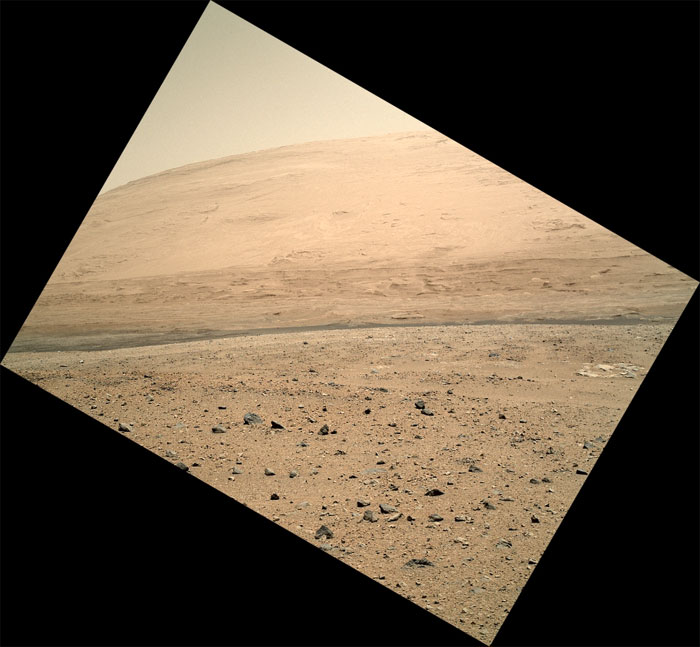
View From Curiosity's Arm-Mounted Camera After a Long Drive
The Mars Hand Lens Imager (MAHLI) camera on NASA's Curiosity rover is carried at an angle when the rover's arm is stowed for driving. Still, the camera is able to record views of the terrain Curiosity is crossing in Gale Crater, and rotating the image 150 degrees provides this right-side-up scene. The scene is toward the south, including a portion of Mount Sharp and a band of dark dunes in front of the mountain. It was taken on the 140th Martian day, or sol, of Curiosity's work on Mars, shortly after Curiosity finished a 329.1-foot (100.3-meter) drive on that sol. The drive was twice as long as any previous sol's drive by Curiosity.
When the robotic arm, turret, and MAHLI are stowed, the MAHLI is looking out from the front left side of the rover. This is much like the view from the driver's side of cars sold in the USA.
The main purpose of Curiosity's MAHLI camera is to acquire close-up, high-resolution views of rocks and soil at the rover's Gale Crater field site. The camera is capable of focusing on any target at distances of about 0.8 inch (2.1 centimeters) to infinity. This means it can, as shown here, also obtain pictures of the Martian landscape.
.
PASADENA, Calif. – NASA's Mars rover Curiosity drove twice as far on July 21 as on any other day of the mission so far: 109.7 yards (100.3 meters).
The length of the drive took advantage of starting the 340th Martian day, or sol, of the mission from a location with an unusually good view for rover engineers to plan a safe path. In weeks to come, the rover team plans to begin using "autonav" capability for the rover to autonomously navigate a path for itself, which could make such long drives more frequent.
Curiosity is about three weeks into a multi-month trek, from the "Glenelg" area where it worked for the first half of 2013, to an entry point for the mission's major destination: the lower layers of Mount Sharp. The mission's longest one-day drive prior to July 21 was about 54 yards (49 meters), on Sol 50 (Sept. 26, 2012). After completing the longer drive, Curiosity drove 68.2 yards (62.4 meters) on July 23 (Sol 342), bringing the mission's total driving distance so far to 0.81 mile (1.23 kilometers).
The Sol 340 drive included three segments, with turns at the end of the first and second segments. Rover planners used information from stereo imaging by the Navigation Camera (Navcam) on Curiosity's mast, plus images from the telephoto-lens Mast Camera (Mastcam). The drive also used the rover's capability to use imagery taken during the drive to calculate the driving distance, a way to verify that wheels have not been slipping too much while turning.
"What enabled us to drive so far on Sol 340 was starting at a high point and also having Mastcam images giving us the size of rocks so we could be sure they were not hazards," said rover planner Paolo Bellutta of NASA's Jet Propulsion Laboratory, Pasadena, Calif. “We could see for quite a distance, but there was an area straight ahead that was not clearly visible, so we had to find a path around that area."
The rover was facing southwest when the sol began. It turned slightly more to the west before driving and used visual odometry to be sure it drove the intended distance (about 55 yards or 50 meters) before turning back farther southward. The second leg, next turn, and third leg completed the drive without visual odometry, though the rover was using another new capability: to turn on visual odometry autonomously if tilt or other factors exceed predetermined limits.
New software on Curiosity gives it the capability to use visual odometry through a range of temperatures. This was needed because testing this spring indicated the Navcam pair linked to the rover's B-side computer is more sensitive to temperature than anticipated. Without the compensating software, the onboard analysis of stereo images could indicate different distances to the same point, depending on the temperature at which the images are taken. The rover was switched from its A-side computer to the redundant B-side computer on Feb. 28 due to a flash-memory problem -- subsequently resolved -- on the A-side. The Navcam pair linked to the A-side computer shows less variability with temperature than the pair now in use.
"For now, we're using visual odometry mostly for slip-checking," said JPL's Jennifer Trosper, deputy project manager for Curiosity. "We are validating the capability to begin using autonav at different temperatures."
The autonomous navigation capability will enable rover planners to command drives that go beyond the route that they can confirm as safe from previous-sol images. They can tell the rover to use the autonomous capability to choose a safe path for itself beyond that distance.
Curiosity landed at the "Bradbury Landing" location within Gale Crater on Aug. 6, 2012, EDT and Universal Time (Aug. 5, PDT). From there, the rover drove eastward to the Glenelg area, where it accomplished the mission's major science objective of finding evidence for an ancient wet environment that had conditions favorable for microbial life. The rover's route is now southwestward. At Mount Sharp, in the middle of Gale Crater, scientists anticipate finding evidence about how the ancient Martian environment changed and evolved.
JPL, a division of the California Institute of Technology, Pasadena, manages the Mars Science Laboratory Project for NASA's Science Mission Directorate, Washington. JPL designed and built the project's Curiosity rover.
.
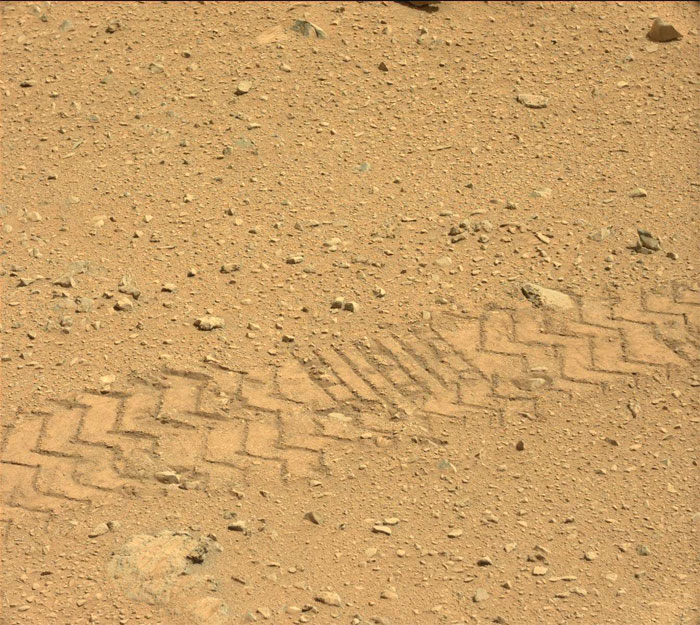
This image was taken by Mastcam: Left (MAST_LEFT) onboard NASA's Mars rover Curiosity on Sol 330 (2013-07-11 02:46:42 UTC).
.
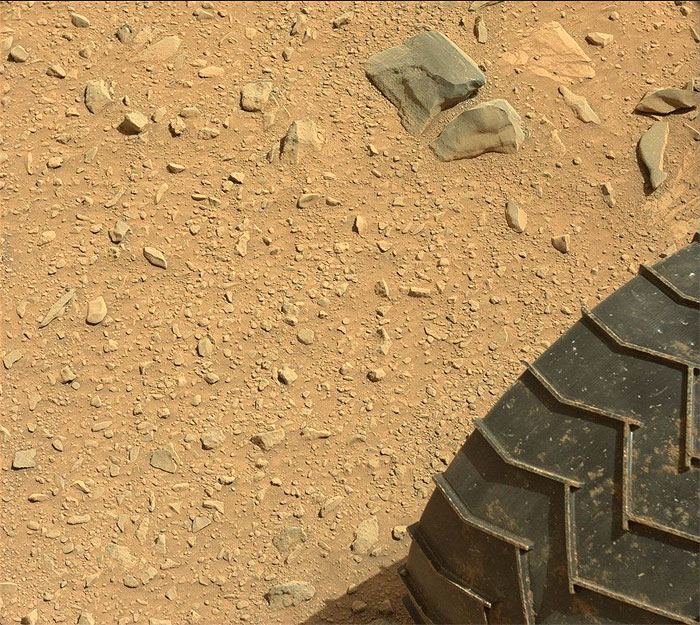
This image was taken by Mastcam: Left (MAST_LEFT) onboard NASA's Mars rover Curiosity on Sol 330 (2013-07-11 02:49:59 UTC).
.
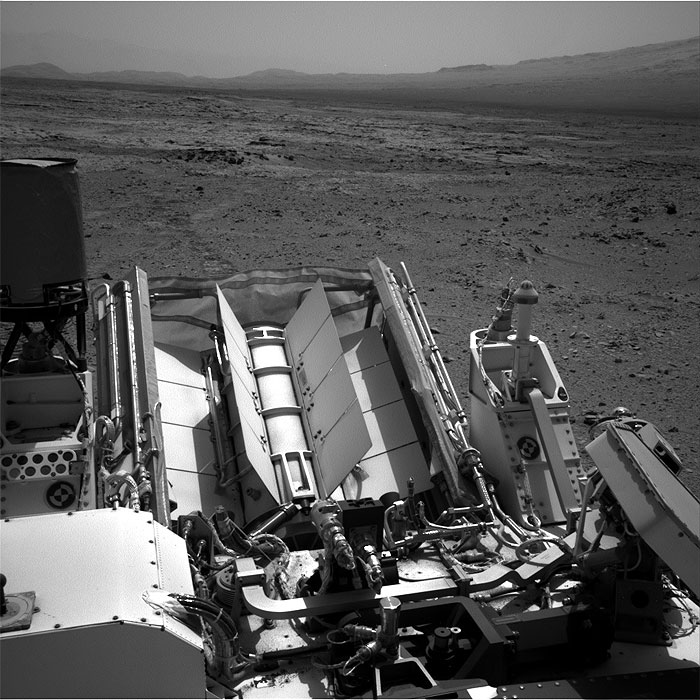
This image was taken by Navcam: Right B (NAV_RIGHT_B) onboard NASA's Mars rover Curiosity on Sol 330 (2013-07-11 02:53:58 UTC).
.
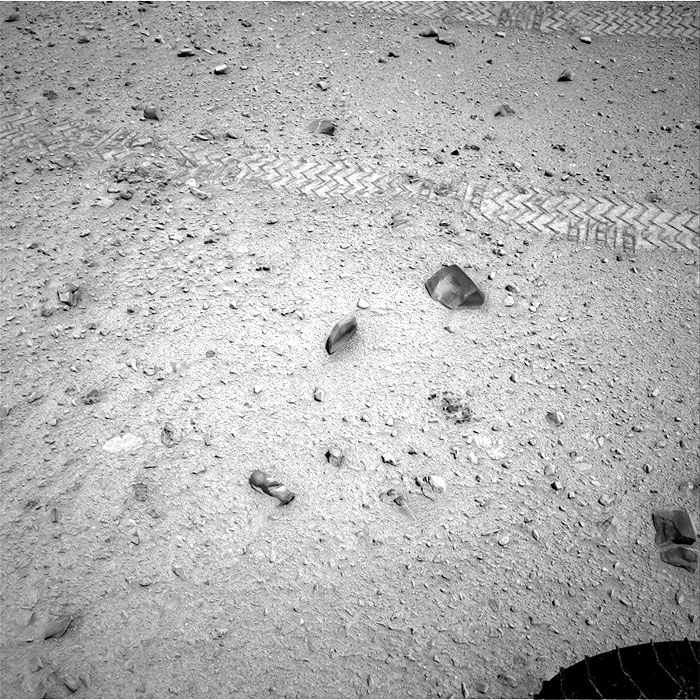
This image was taken by Navcam: Right B (NAV_RIGHT_B) onboard NASA's Mars rover Curiosity on Sol 330 (2013-07-11 03:13:32 UTC).
.
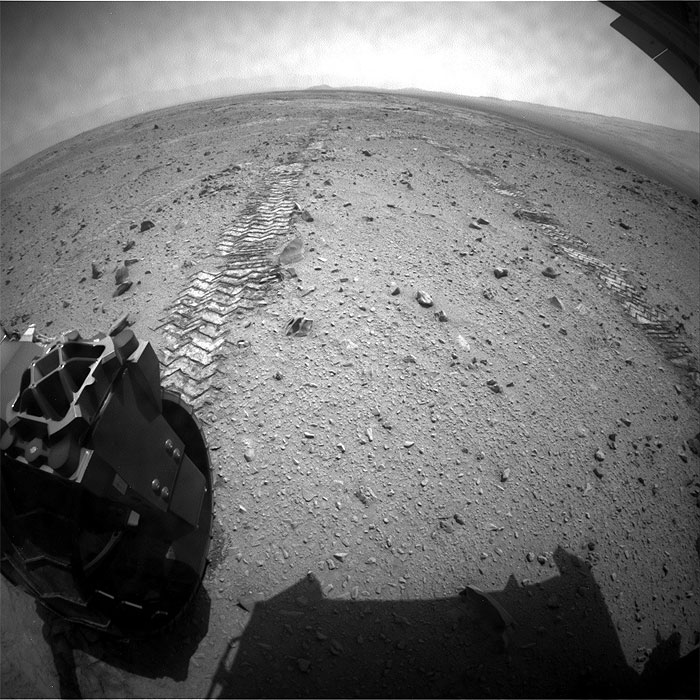
This image was taken by Rear Hazcam: Left B (RHAZ_LEFT_B) onboard NASA's Mars rover Curiosity on Sol 330 (2013-07-11 02:33:19 UTC).
.
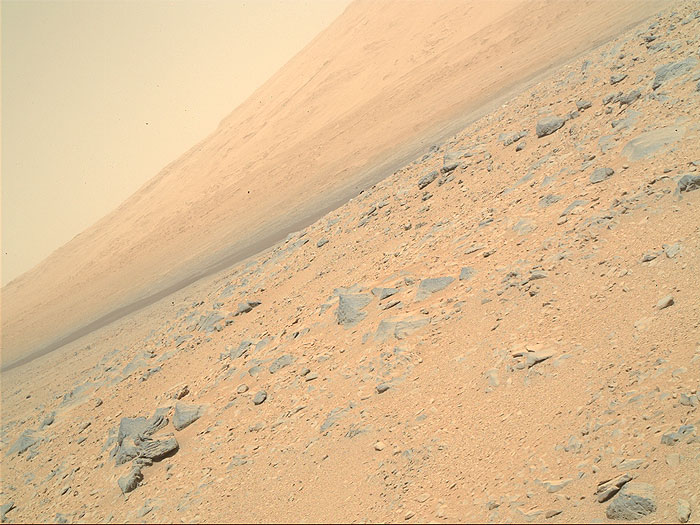
NASA's Mars rover Curiosity acquired this image using its Mars Hand Lens Imager (MAHLI), located on the turret at the end of the rover's robotic arm, on July 12, 2013, Sol 331 of the Mars Science Laboratory Mission, at 06:34:23 UTC.
When this image was obtained, the focus motor count position was 12552. This number indicates the internal position of the MAHLI lens at the time the image was acquired. This count also tells whether the dust cover was open or closed. Values between 0 and 6000 mean the dust cover was closed; values between 12500 and 16000 occur when the cover is open. For close-up images, the motor count can in some cases be used to estimate the distance between the MAHLI lens and target. For example, in-focus images obtained with the dust cover open for which the lens was 2.5 cm from the target have a motor count near 15270. If the lens is 5 cm from the target, the motor count is near 14360; if 7 cm, 13980; 10 cm, 13635; 15 cm, 13325; 20 cm, 13155; 25 cm, 13050; 30 cm, 12970. These correspond to image scales, in micrometers per pixel, of about 16, 25, 32, 42, 60, 77, 95, and 113.
Most images acquired by MAHLI in daylight use the sun as an illumination source. However, in some cases, MAHLI's two groups of white light LEDs and one group of longwave ultraviolet (UV) LEDs might be used to illuminate targets. When Curiosity acquired this image, the group 1 white light LEDs were off, the group 2 white light LEDs were off, and the ultraviolet (UV) LEDS were off.
.
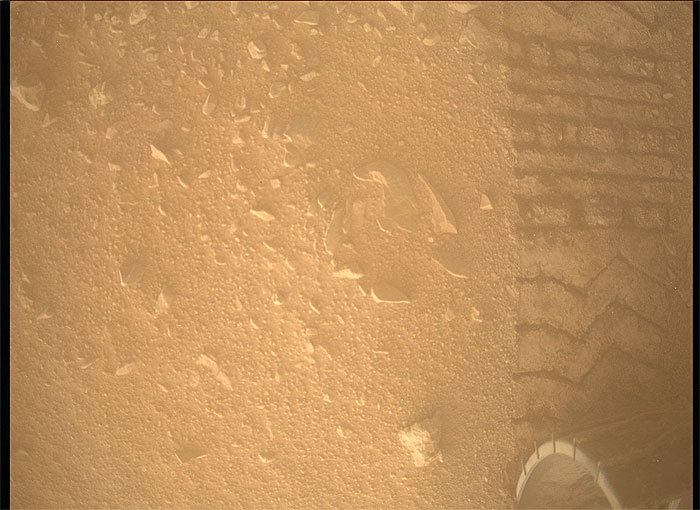
This image was taken by Mars Descent Imager (MARDI) onboard NASA's Mars rover Curiosity on Sol 331 (2013-07-12 11:59:05 UTC).
.
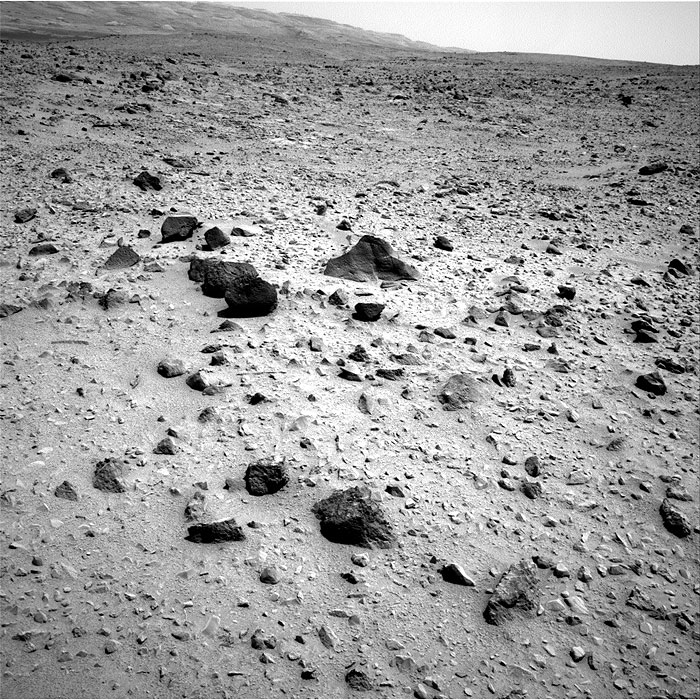
This image was taken by Navcam: Right B (NAV_RIGHT_B) onboard NASA's Mars rover Curiosity on Sol 331 (2013-07-12 06:38:32 UTC).
.
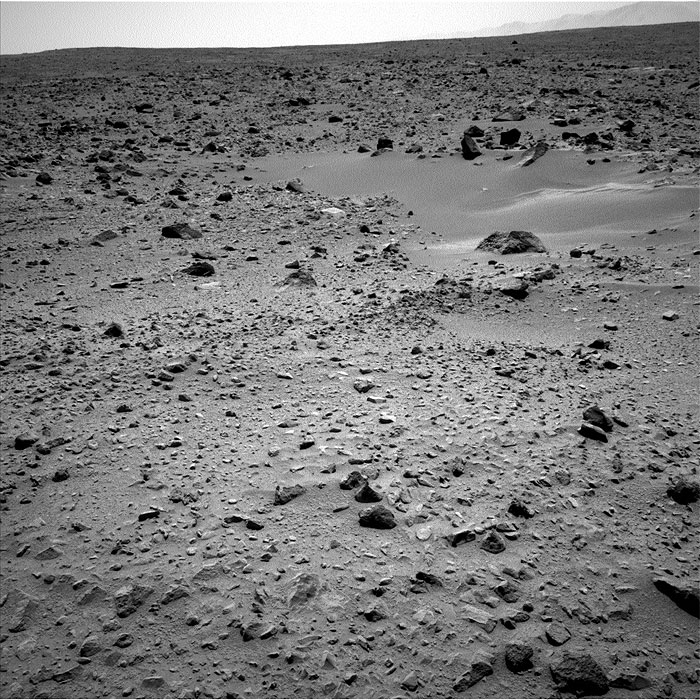
This image was taken by Navcam: Left B (NAV_LEFT_B) onboard NASA's Mars rover Curiosity on Sol 331 (2013-07-12 06:39:36 UTC).
.
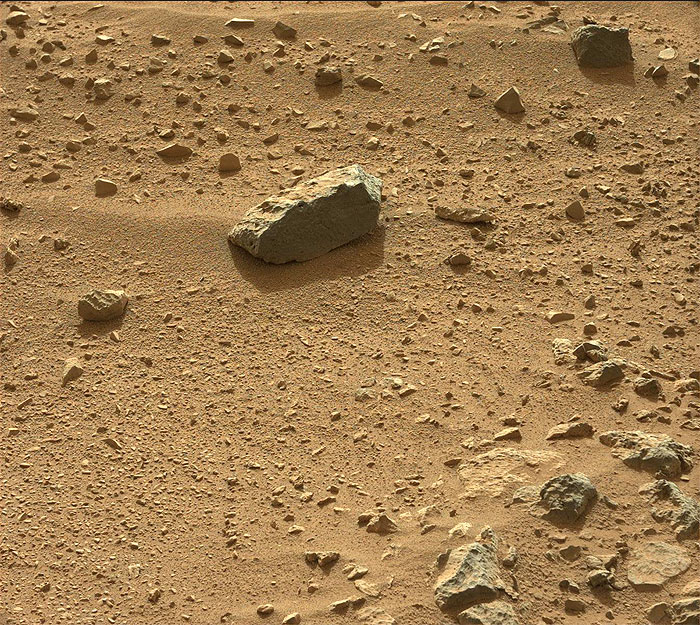
This image was taken by Mastcam: Left (MAST_LEFT) onboard NASA's Mars rover Curiosity on Sol 333 (2013-07-14 10:26:04 UTC).
.
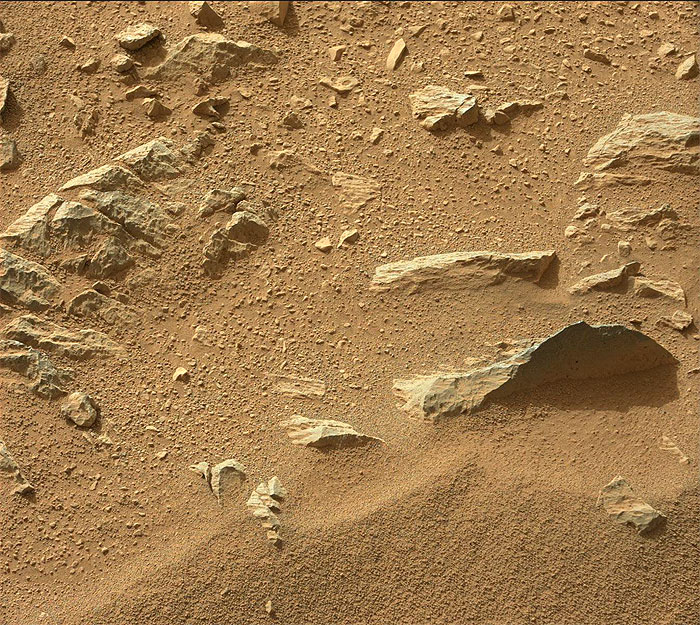
This image was taken by Mastcam: Left (MAST_LEFT) onboard NASA's Mars rover Curiosity on Sol 333 (2013-07-14 10:36:57 UTC).
.
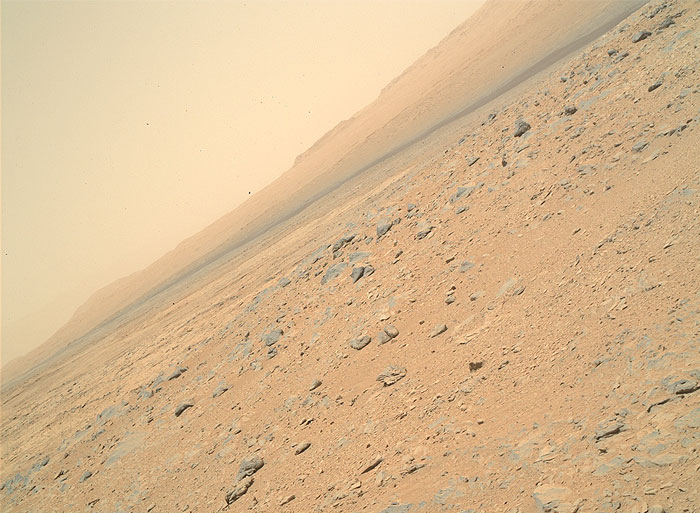
NASA's Mars rover Curiosity acquired this image using its Mars Hand Lens Imager (MAHLI), located on the turret at the end of the rover's robotic arm, on July 14, 2013, Sol 333 of the Mars Science Laboratory Mission, at 07:27:26 UTC.
When this image was obtained, the focus motor count position was 12552. This number indicates the internal position of the MAHLI lens at the time the image was acquired. This count also tells whether the dust cover was open or closed. Values between 0 and 6000 mean the dust cover was closed; values between 12500 and 16000 occur when the cover is open. For close-up images, the motor count can in some cases be used to estimate the distance between the MAHLI lens and target. For example, in-focus images obtained with the dust cover open for which the lens was 2.5 cm from the target have a motor count near 15270. If the lens is 5 cm from the target, the motor count is near 14360; if 7 cm, 13980; 10 cm, 13635; 15 cm, 13325; 20 cm, 13155; 25 cm, 13050; 30 cm, 12970. These correspond to image scales, in micrometers per pixel, of about 16, 25, 32, 42, 60, 77, 95, and 113.
Most images acquired by MAHLI in daylight use the sun as an illumination source. However, in some cases, MAHLI's two groups of white light LEDs and one group of longwave ultraviolet (UV) LEDs might be used to illuminate targets. When Curiosity acquired this image, the group 1 white light LEDs were off, the group 2 white light LEDs were off, and the ultraviolet (UV) LEDS were off.
.
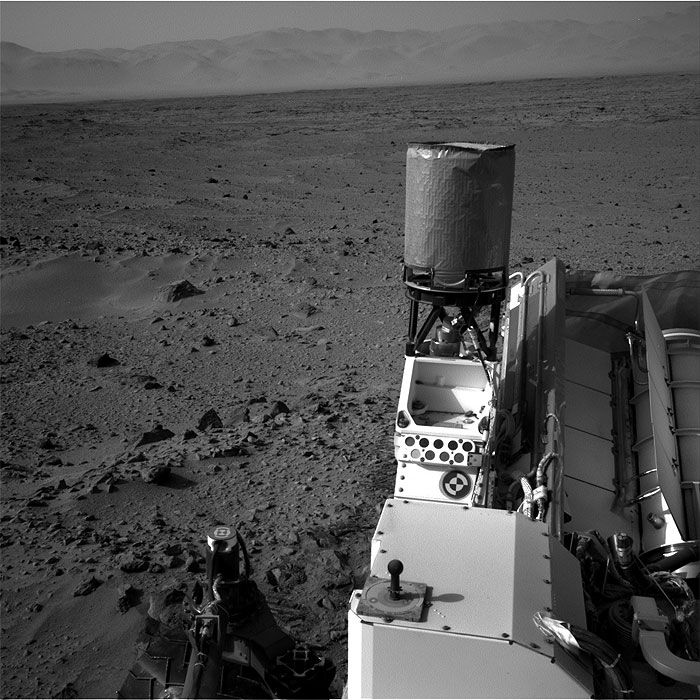
This image was taken by Navcam: Right B (NAV_RIGHT_B) onboard NASA's Mars rover Curiosity on Sol 333 (2013-07-14 10:16:07 UTC).
.
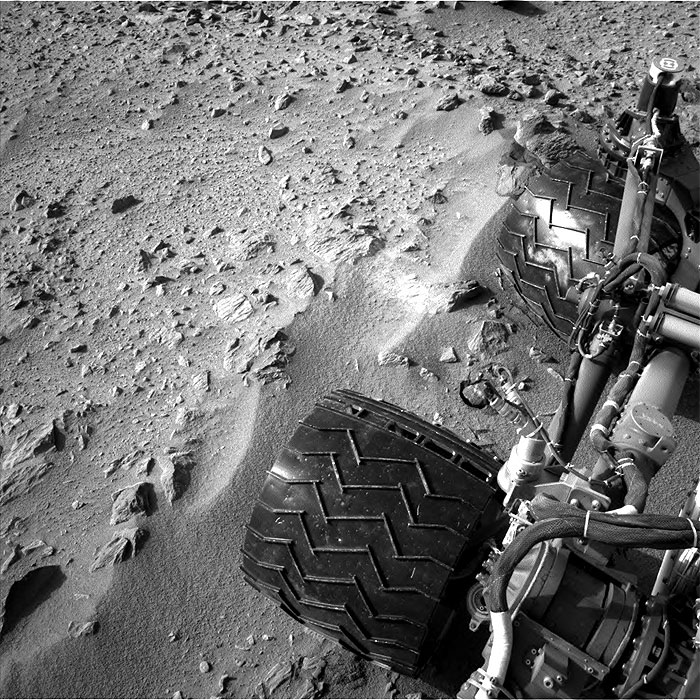
This image was taken by Navcam: Left B (NAV_LEFT_B) onboard NASA's Mars rover Curiosity on Sol 333 (2013-07-14 10:21:34 UTC).
.
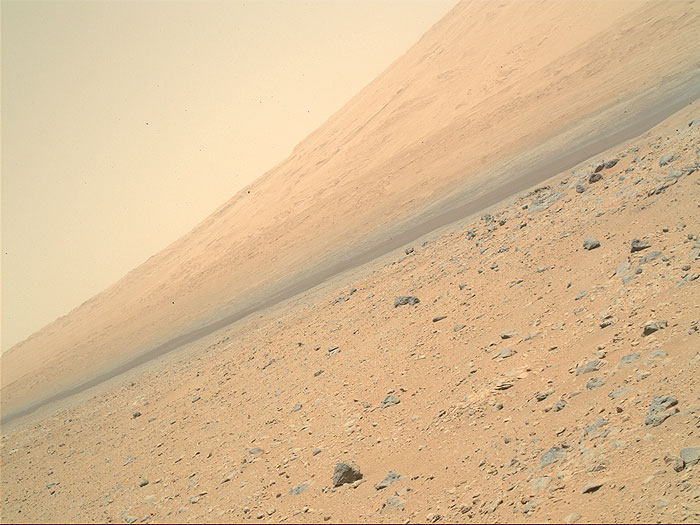
NASA's Mars rover Curiosity acquired this image using its Mars Hand Lens Imager (MAHLI), located on the turret at the end of the rover's robotic arm, on July 16, 2013, Sol 335 of the Mars Science Laboratory Mission, at 08:39:57 UTC.
When this image was obtained, the focus motor count position was 12552. This number indicates the internal position of the MAHLI lens at the time the image was acquired. This count also tells whether the dust cover was open or closed. Values between 0 and 6000 mean the dust cover was closed; values between 12500 and 16000 occur when the cover is open. For close-up images, the motor count can in some cases be used to estimate the distance between the MAHLI lens and target. For example, in-focus images obtained with the dust cover open for which the lens was 2.5 cm from the target have a motor count near 15270. If the lens is 5 cm from the target, the motor count is near 14360; if 7 cm, 13980; 10 cm, 13635; 15 cm, 13325; 20 cm, 13155; 25 cm, 13050; 30 cm, 12970. These correspond to image scales, in micrometers per pixel, of about 16, 25, 32, 42, 60, 77, 95, and 113.
Most images acquired by MAHLI in daylight use the sun as an illumination source. However, in some cases, MAHLI's two groups of white light LEDs and one group of longwave ultraviolet (UV) LEDs might be used to illuminate targets. When Curiosity acquired this image, the group 1 white light LEDs were off, the group 2 white light LEDs were off, and the ultraviolet (UV) LEDS were off.
.
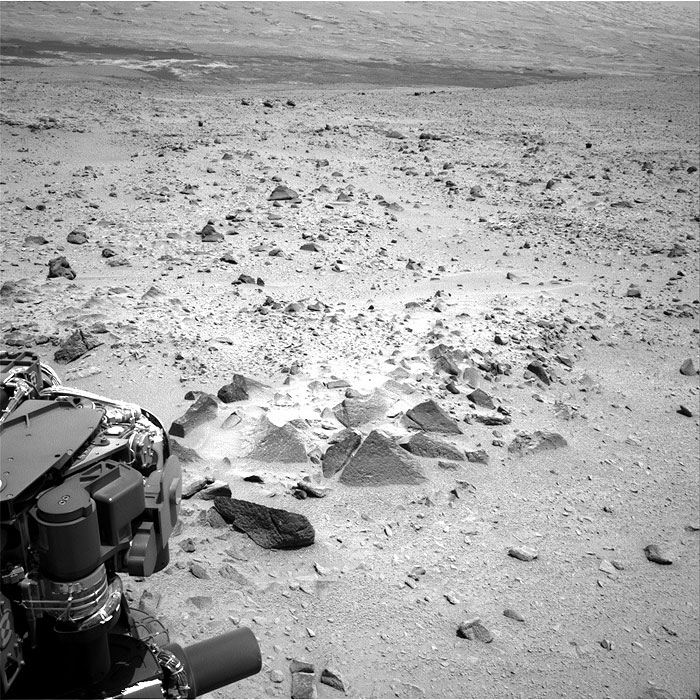
This image was taken by Navcam: Right B (NAV_RIGHT_B) onboard NASA's Mars rover Curiosity on Sol 335 (2013-07-16 08:43:50 UTC).
.
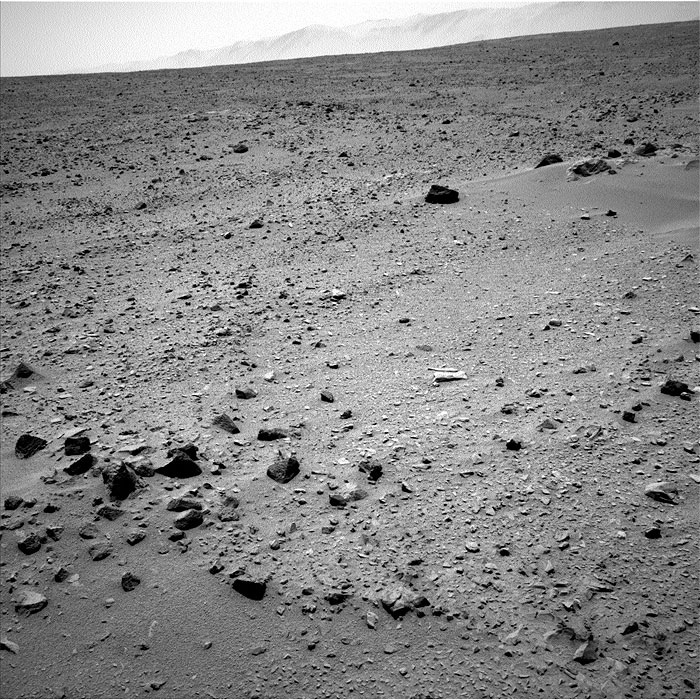
This image was taken by Navcam: Left B (NAV_LEFT_B) onboard NASA's Mars rover Curiosity on Sol 335 (2013-07-16 08:45:41 UTC).
.
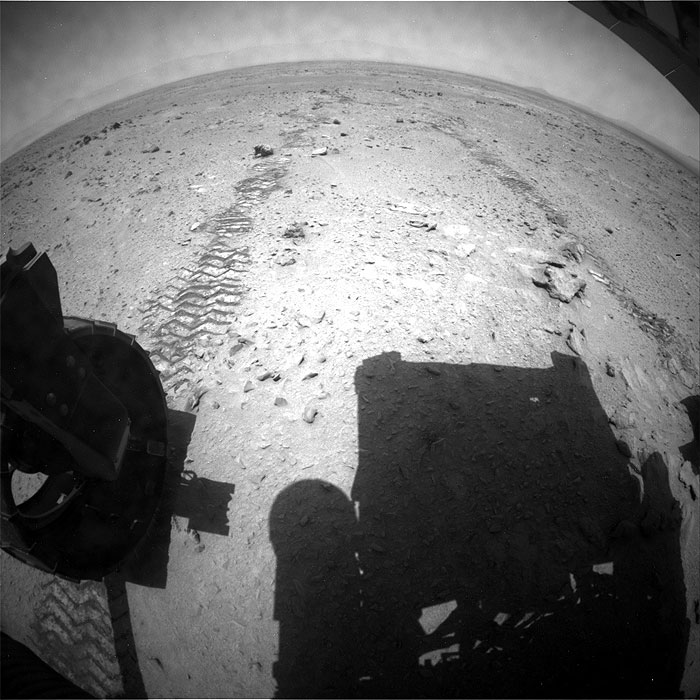
This image was taken by Rear Hazcam: Right B (RHAZ_RIGHT_B) onboard NASA's Mars rover Curiosity on Sol 335 (2013-07-16 07:52:01 UTC).
.
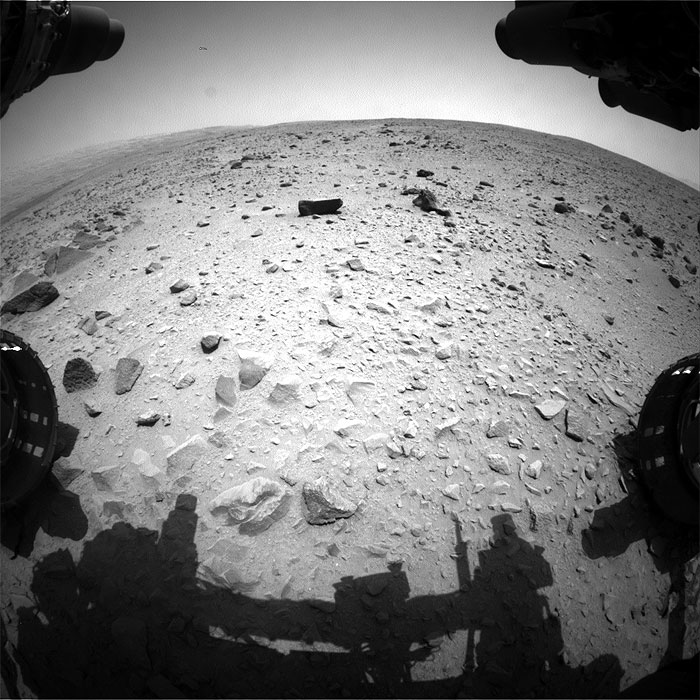
This image was taken by Front Hazcam: Right B (FHAZ_RIGHT_B) onboard NASA's Mars rover Curiosity on Sol 335 (2013-07-16 08:42:21 UTC).
.
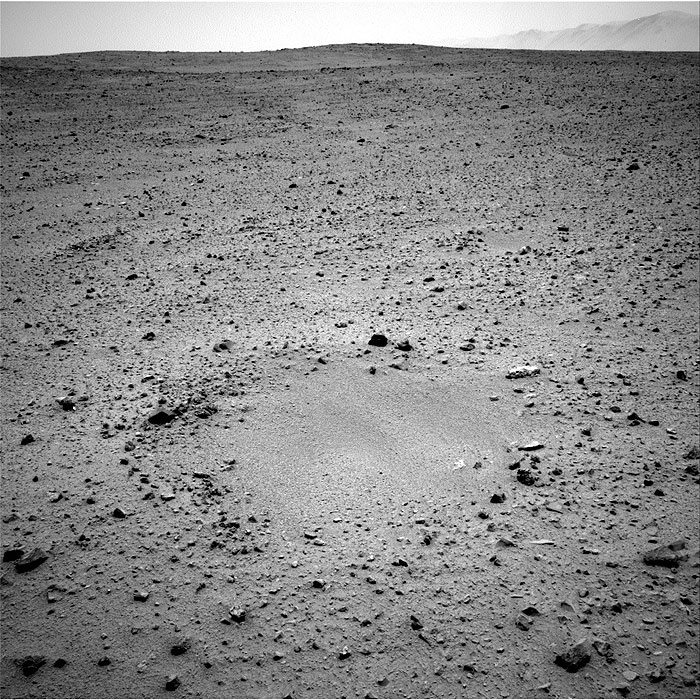
This image was taken by Navcam: Right B (NAV_RIGHT_B) onboard NASA's Mars rover Curiosity on Sol 336 (2013-07-17 09:08:15 UTC).
.
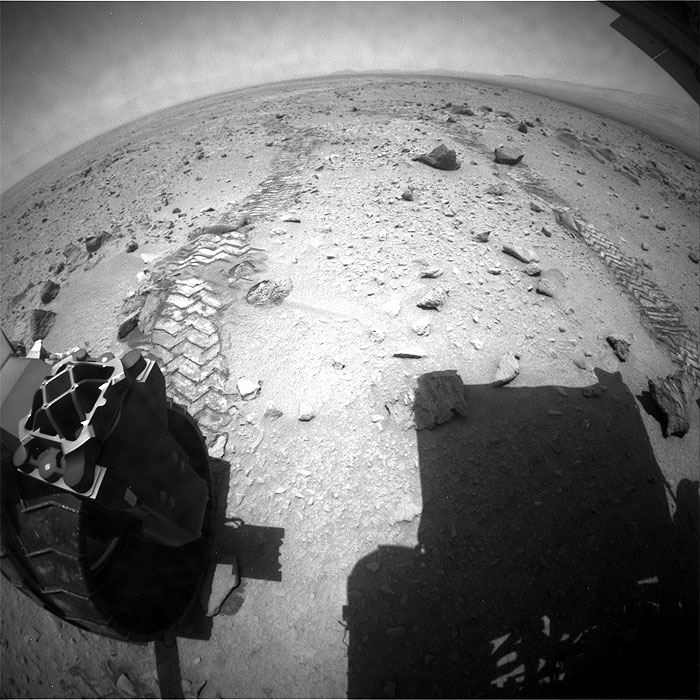
This image was taken by Rear Hazcam: Left B (RHAZ_LEFT_B) onboard NASA's Mars rover Curiosity on Sol 336 (2013-07-17 08:18:18 UTC).
.
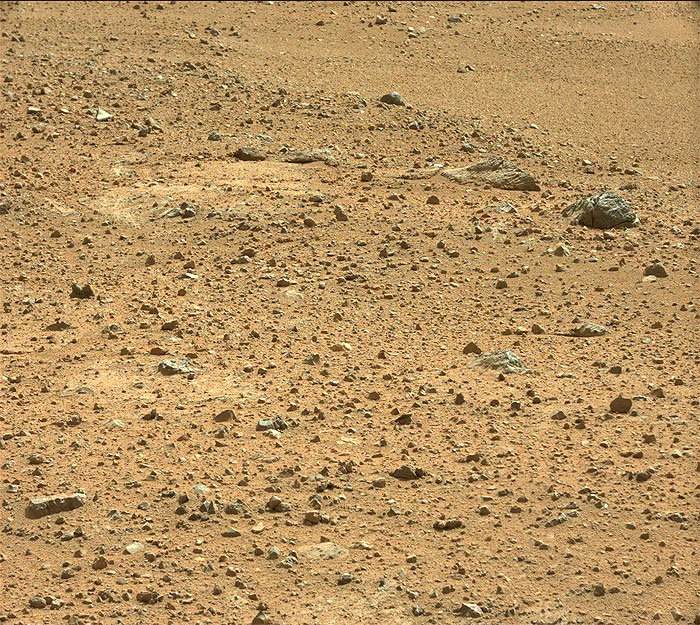
This image was taken by Mastcam: Left (MAST_LEFT) onboard NASA's Mars rover Curiosity on Sol 337 (2013-07-18 11:38:03 UTC).
.
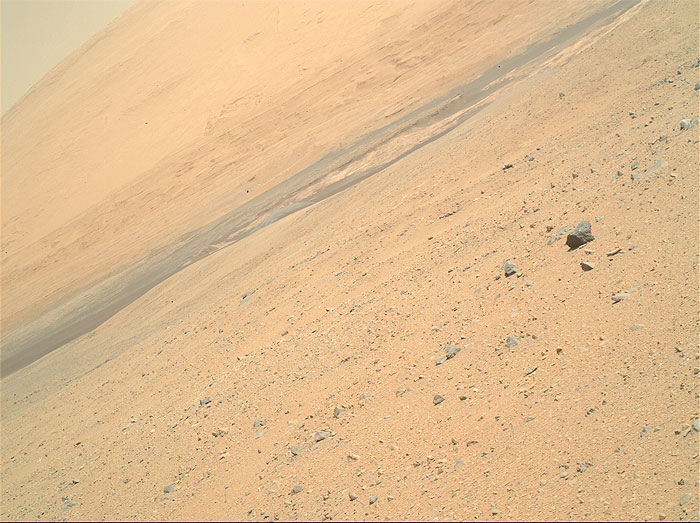
NASA's Mars rover Curiosity acquired this image using its Mars Hand Lens Imager (MAHLI), located on the turret at the end of the rover's robotic arm, on July 18, 2013, Sol 337 of the Mars Science Laboratory Mission, at 10:59:27 UTC.
When this image was obtained, the focus motor count position was 12552. This number indicates the internal position of the MAHLI lens at the time the image was acquired. This count also tells whether the dust cover was open or closed. Values between 0 and 6000 mean the dust cover was closed; values between 12500 and 16000 occur when the cover is open. For close-up images, the motor count can in some cases be used to estimate the distance between the MAHLI lens and target. For example, in-focus images obtained with the dust cover open for which the lens was 2.5 cm from the target have a motor count near 15270. If the lens is 5 cm from the target, the motor count is near 14360; if 7 cm, 13980; 10 cm, 13635; 15 cm, 13325; 20 cm, 13155; 25 cm, 13050; 30 cm, 12970. These correspond to image scales, in micrometers per pixel, of about 16, 25, 32, 42, 60, 77, 95, and 113.
Most images acquired by MAHLI in daylight use the sun as an illumination source. However, in some cases, MAHLI's two groups of white light LEDs and one group of longwave ultraviolet (UV) LEDs might be used to illuminate targets. When Curiosity acquired this image, the group 1 white light LEDs were off, the group 2 white light LEDs were off, and the ultraviolet (UV) LEDS were off.
.
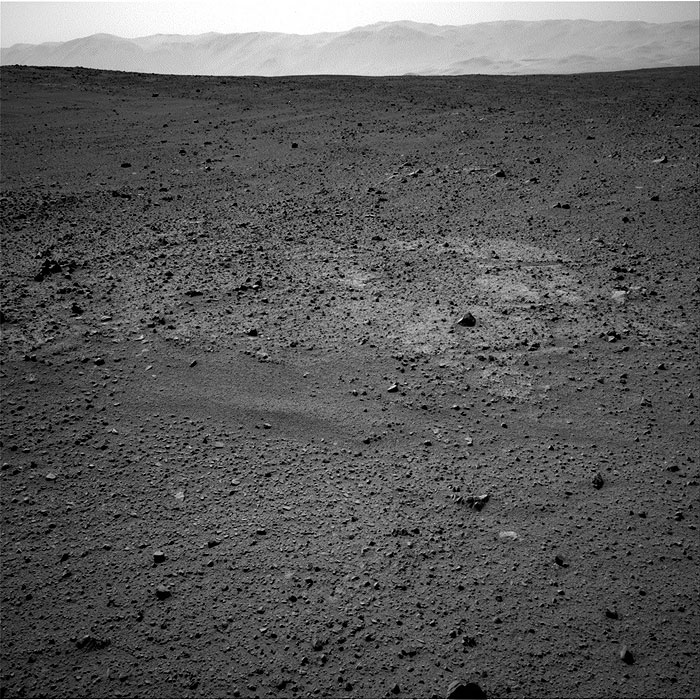
This image was taken by Navcam: Right B (NAV_RIGHT_B) onboard NASA's Mars rover Curiosity on Sol 337 (2013-07-18 11:35:31 UTC).
.
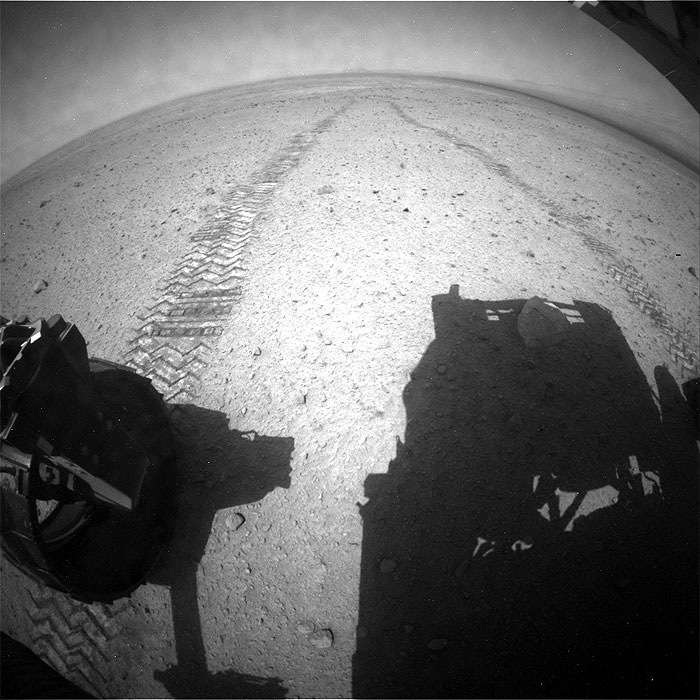
This image was taken by Rear Hazcam: Right B (RHAZ_RIGHT_B) onboard NASA's Mars rover Curiosity on Sol 337 (2013-07-18 10:29:52 UTC).
.
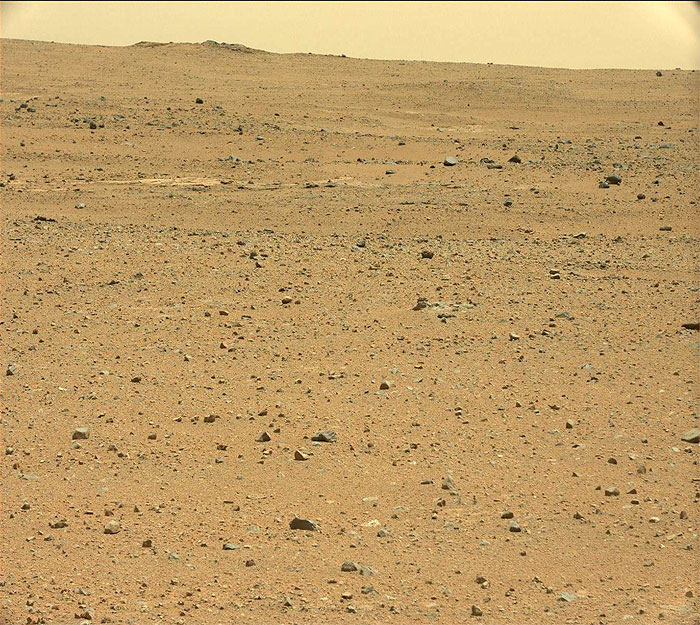
This image was taken by Mastcam: Left (MAST_LEFT) onboard NASA's Mars rover Curiosity on Sol 338 (2013-07-19 10:43:26 UTC).
.
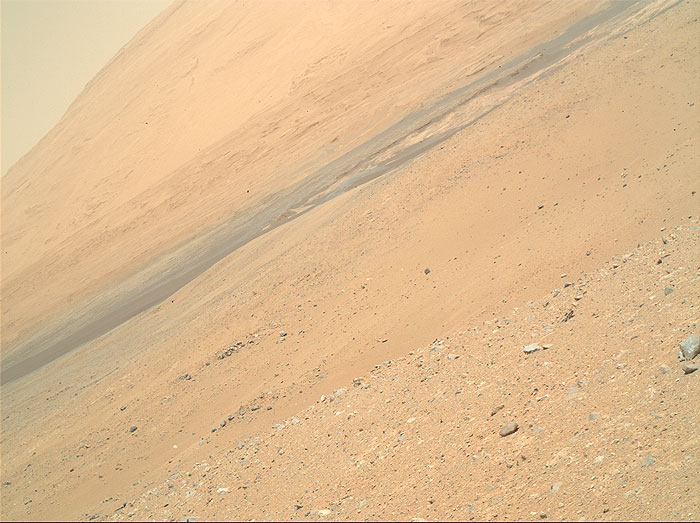
NASA's Mars rover Curiosity acquired this image using its Mars Hand Lens Imager (MAHLI), located on the turret at the end of the rover's robotic arm, on July 19, 2013, Sol 338 of the Mars Science Laboratory Mission, at 10:36:13 UTC.
When this image was obtained, the focus motor count position was 12552. This number indicates the internal position of the MAHLI lens at the time the image was acquired. This count also tells whether the dust cover was open or closed. Values between 0 and 6000 mean the dust cover was closed; values between 12500 and 16000 occur when the cover is open. For close-up images, the motor count can in some cases be used to estimate the distance between the MAHLI lens and target. For example, in-focus images obtained with the dust cover open for which the lens was 2.5 cm from the target have a motor count near 15270. If the lens is 5 cm from the target, the motor count is near 14360; if 7 cm, 13980; 10 cm, 13635; 15 cm, 13325; 20 cm, 13155; 25 cm, 13050; 30 cm, 12970. These correspond to image scales, in micrometers per pixel, of about 16, 25, 32, 42, 60, 77, 95, and 113.
Most images acquired by MAHLI in daylight use the sun as an illumination source. However, in some cases, MAHLI's two groups of white light LEDs and one group of longwave ultraviolet (UV) LEDs might be used to illuminate targets. When Curiosity acquired this image, the group 1 white light LEDs were off, the group 2 white light LEDs were off, and the ultraviolet (UV) LEDS were off.
.
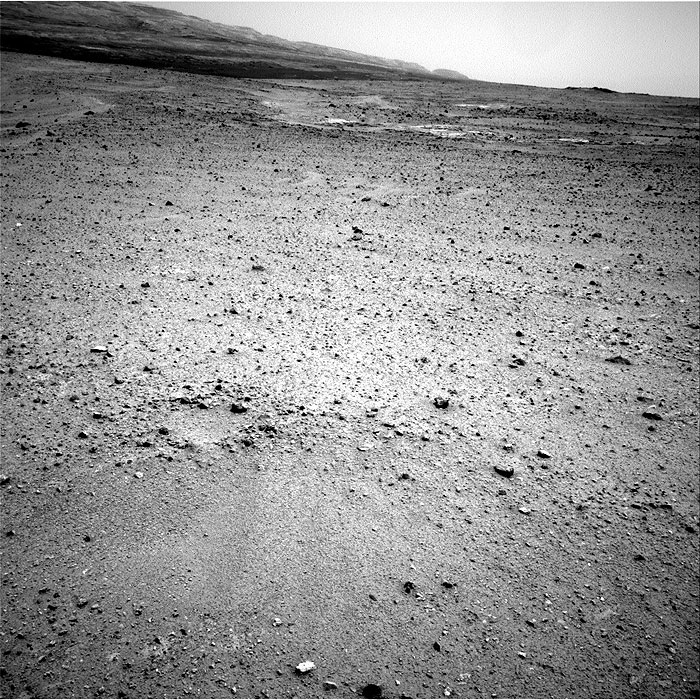
This image was taken by Navcam: Right B (NAV_RIGHT_B) onboard NASA's Mars rover Curiosity on Sol 338 (2013-07-19 10:40:26 UTC).
.
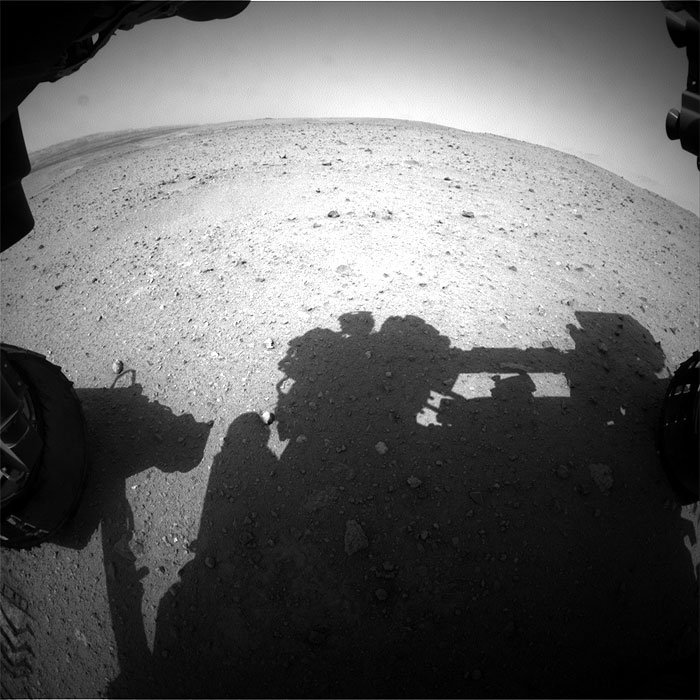
This image was taken by Front Hazcam: Left B (FHAZ_LEFT_B) onboard NASA's Mars rover Curiosity on Sol 339 (2013-07-20 08:28:08 UTC).
,
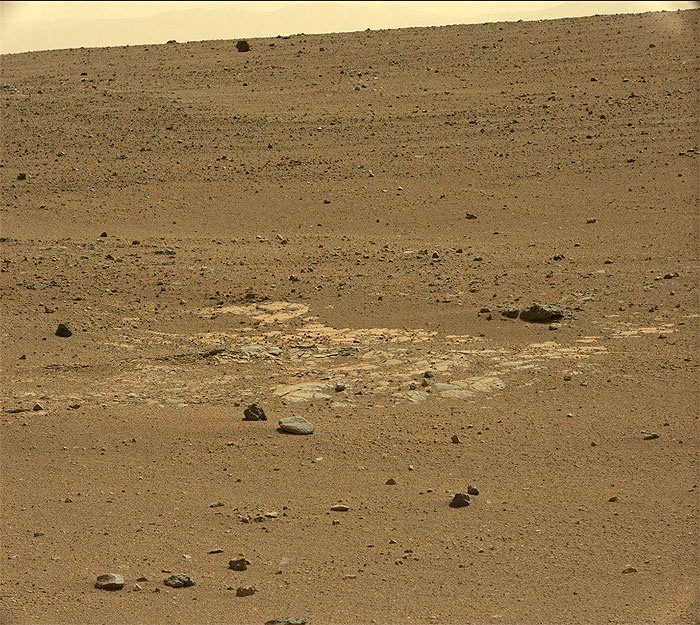
This image was taken by Mastcam: Left (MAST_LEFT) onboard NASA's Mars rover Curiosity on Sol 340 (2013-07-21 13:43:56 UTC).
.
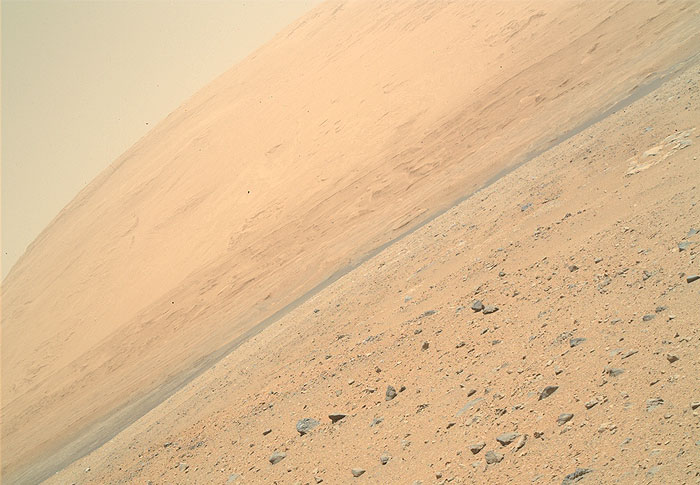
NASA's Mars rover Curiosity acquired this image using its Mars Hand Lens Imager (MAHLI), located on the turret at the end of the rover's robotic arm, on July 21, 2013, Sol 340 of the Mars Science Laboratory Mission, at 11:54:31 UTC.
When this image was obtained, the focus motor count position was 12552. This number indicates the internal position of the MAHLI lens at the time the image was acquired. This count also tells whether the dust cover was open or closed. Values between 0 and 6000 mean the dust cover was closed; values between 12500 and 16000 occur when the cover is open. For close-up images, the motor count can in some cases be used to estimate the distance between the MAHLI lens and target. For example, in-focus images obtained with the dust cover open for which the lens was 2.5 cm from the target have a motor count near 15270. If the lens is 5 cm from the target, the motor count is near 14360; if 7 cm, 13980; 10 cm, 13635; 15 cm, 13325; 20 cm, 13155; 25 cm, 13050; 30 cm, 12970. These correspond to image scales, in micrometers per pixel, of about 16, 25, 32, 42, 60, 77, 95, and 113.
Most images acquired by MAHLI in daylight use the sun as an illumination source. However, in some cases, MAHLI's two groups of white light LEDs and one group of longwave ultraviolet (UV) LEDs might be used to illuminate targets. When Curiosity acquired this image, the group 1 white light LEDs were off, the group 2 white light LEDs were off, and the ultraviolet (UV) LEDS were off.
.
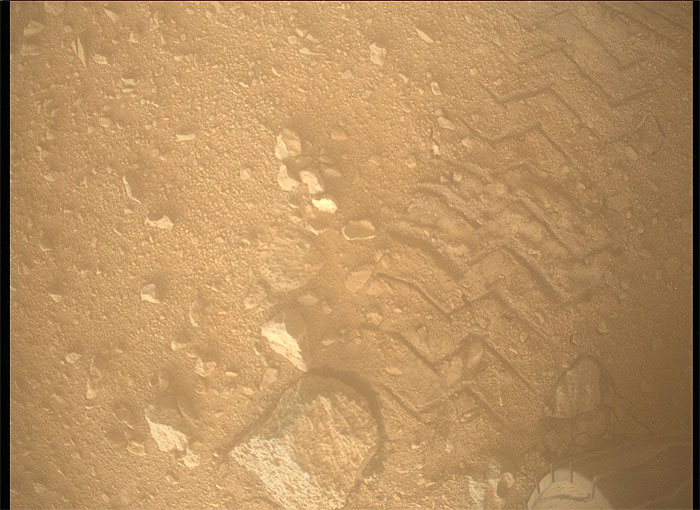
This image was taken by Mars Descent Imager (MARDI) onboard NASA's Mars rover Curiosity on Sol 340 (2013-07-21 17:57:02 UTC).
.
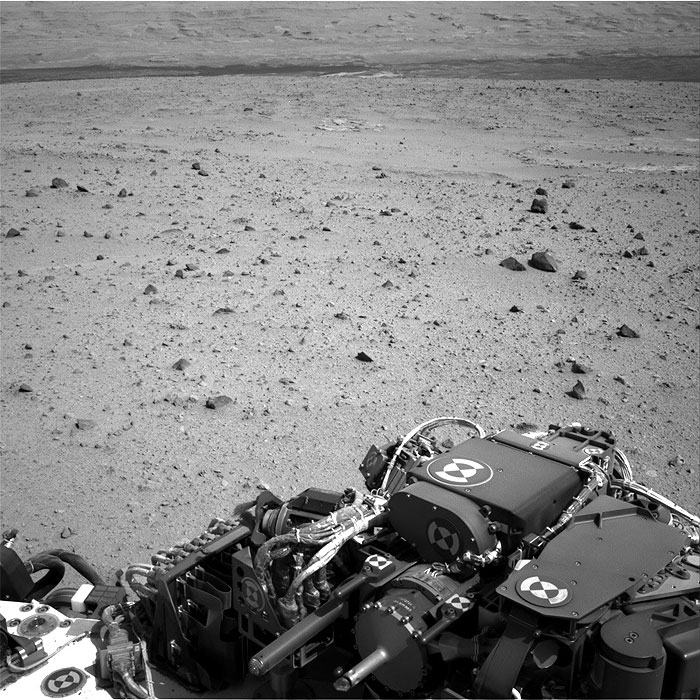
This image was taken by Navcam: Right B (NAV_RIGHT_B) onboard NASA's Mars rover Curiosity on Sol 340 (2013-07-21 13:51:18 UTC).
.
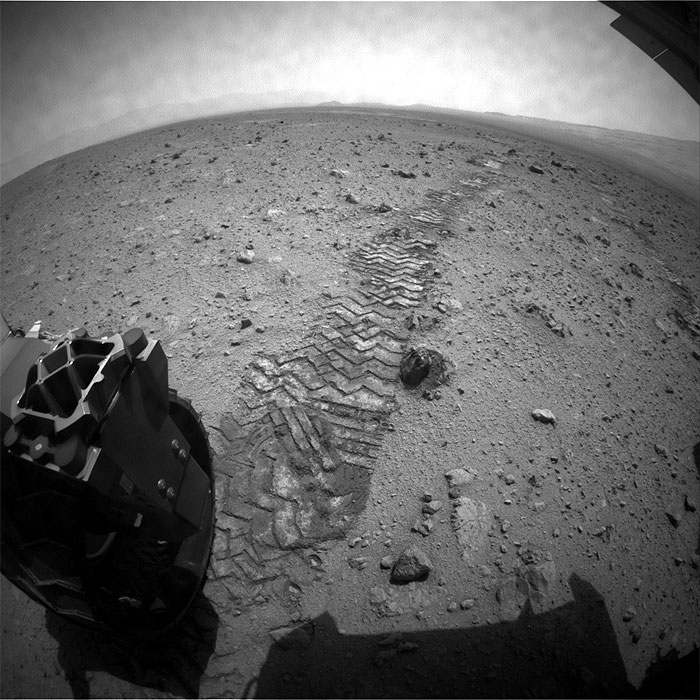
This image was taken by Rear Hazcam: Left B (RHAZ_LEFT_B) onboard NASA's Mars rover Curiosity on Sol 341 (2013-07-22 09:47:43 UTC).
.
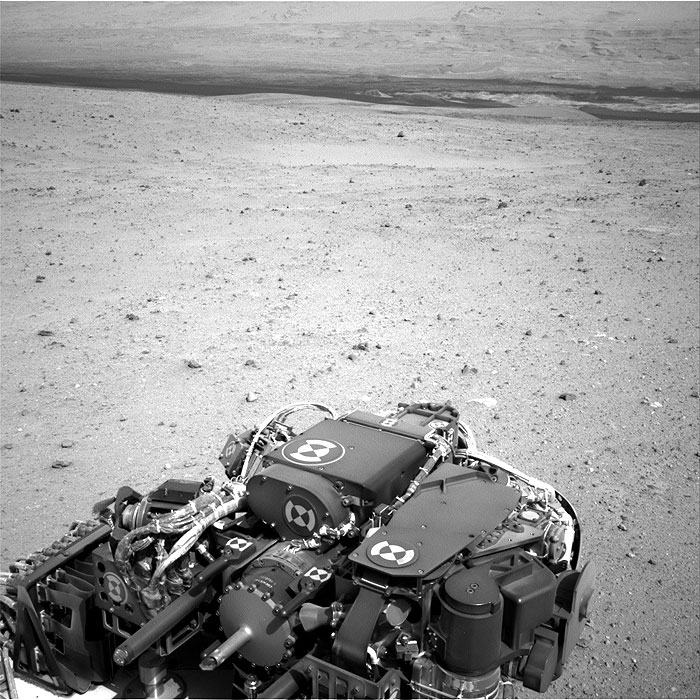
This image was taken by Navcam: Right B (NAV_RIGHT_B) onboard NASA's Mars rover Curiosity on Sol 342 (2013-07-23 15:11:03 UTC).
.
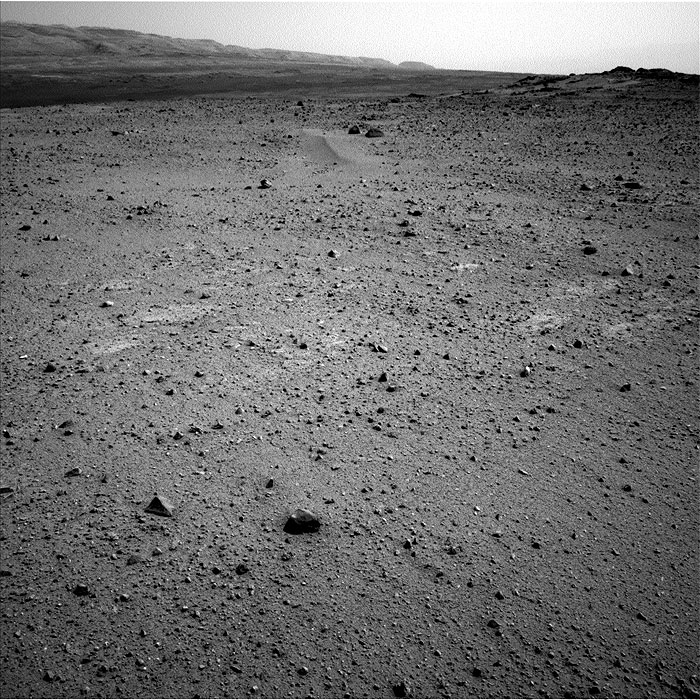
This image was taken by Navcam: Left B (NAV_LEFT_B) onboard NASA's Mars rover Curiosity on Sol 342 (2013-07-23 15:01:11 UTC).
.
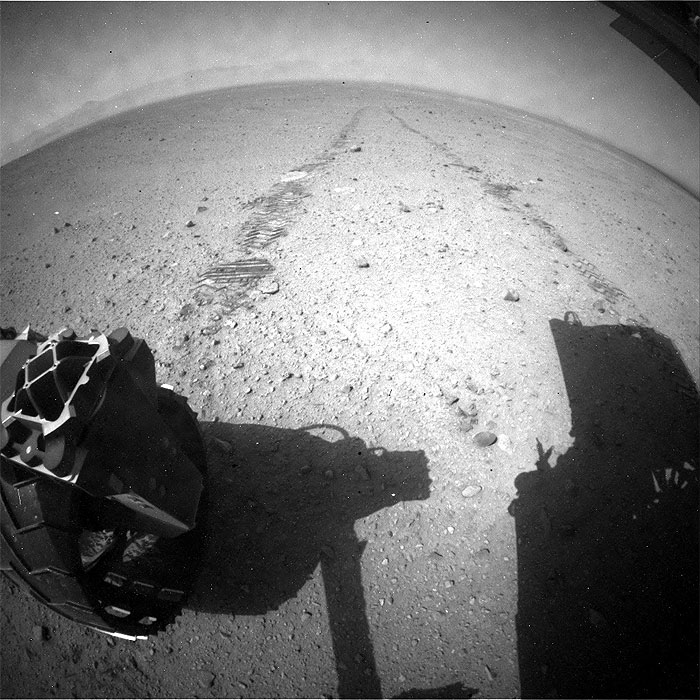
This image was taken by Rear Hazcam: Left B (RHAZ_LEFT_B) onboard NASA's Mars rover Curiosity on Sol 342 (2013-07-23 14:59:42 UTC).
.
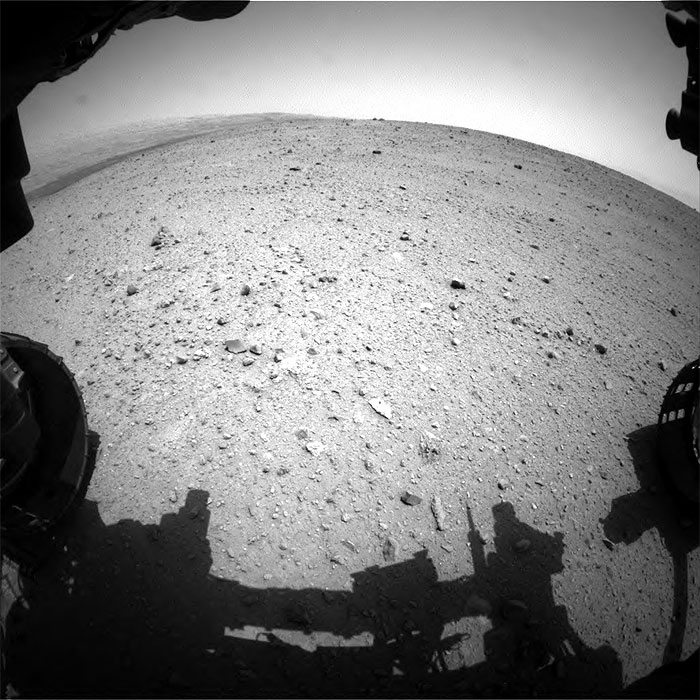
This image was taken by Front Hazcam: Left B (FHAZ_LEFT_B) onboard NASA's Mars rover Curiosity on Sol 342 (2013-07-23 13:41:07 UTC).
.
Fotos: NASA
5667 Views
